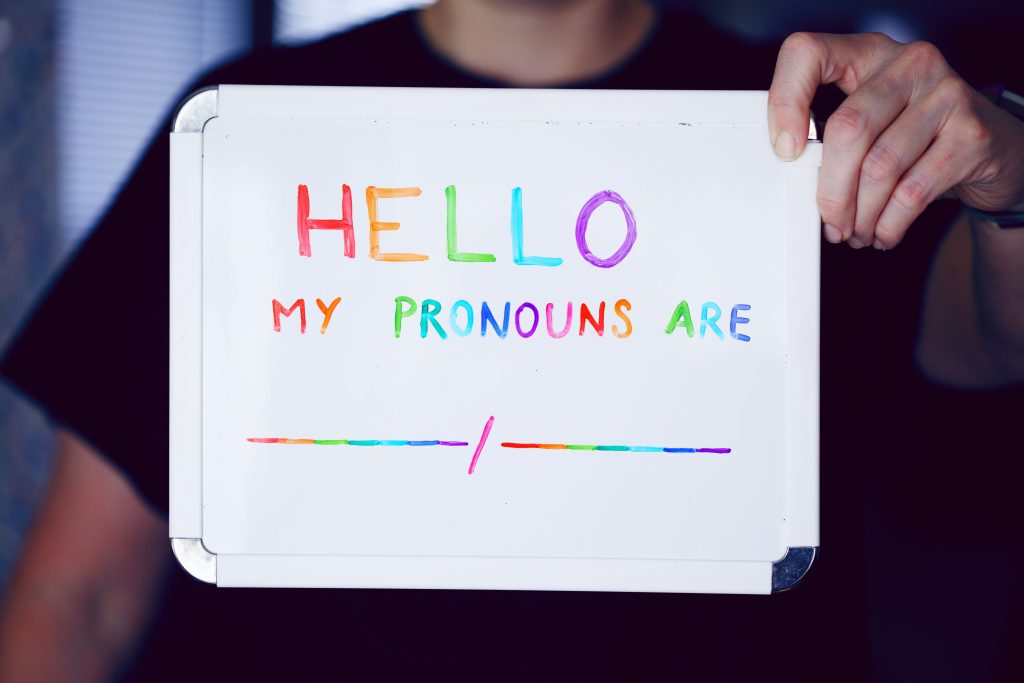By Stephen McAlpine
Pronouns: the mere presence of the term strikes uncertainty among many Australians today, particularly Christians.
Should I use preferred pronouns? Should I not? What’s at stake? Is it love? Is it truth? How do I decide? Do different settings require different responses? Does God care?

It’s not just choosing pronouns, but choosing whether to honour them, that makes a statement, writes Stephen McAlpine. (Photo: Alexander Grey on Unsplash.)
Once upon a time, if a person had any uncertainty about pronouns, it was likely uncertainty about what the word actually meant. That says something about the intellectual and moral vacuity of the Australian secular education system that bore us – and, let’s face it, bored us – such that most people my age (57) and below did not know what a pronoun was.
Thanks to the ubiquitous HR department, that deficiency in primary school education has been fairly promptly rectified. (But don’t get me started on what a proper noun is.)
The pronoun debate in Australia – and indeed around the rest of the Western world – highlights the current conflict around a series of questions to do with what we call “anthropology”: the study or science of what it means to be human. Further to that, not simply what it means to be human, but also what a human is for, and more pointedly again, who a human is for.
Anthropology and Theology
The pronoun debate is not merely sociological or cultural, but theological: the Bible has a lot to say – indeed, it is foundational in what it says – and declares that it brooks no rival concerning such truths about all three of those questions: “What are we?”, “What are we for?” and “Who are we for?” Because of the Bible’s position, there is no sense in which we can share the gospel of the Lord Jesus without anthropology coming up front and centre. We cannot defer the pressing questions we’re going to be asked by a curious, and often hostile, culture concerning what the Bible has to say about sexuality, identity and gender.
That “get to it later” idea is a suggestion I’ve heard over the past few years. The argument goes like this: dial down the sex and gender stuff, remove the heat of the issue, and allow some gospel cut-through; then, once a person grasps the gospel and is saved, we can bring up that other stuff. That is a misguided assumption on three levels.
An Extracted Gospel
First, deferring the discussion of identity assumes that the gospel is somehow an essence of an idea extracted from everyday life, a message to intellectually assent to without it being tethered to your human experience and your human response. This extraction strategy may appear to provide an escape route from the burn you might get from angry dissenters, but the gospel message we proclaim cannot be extricated from the conditions we experience. There is no “humanless” gospel message, an abstract set of ideals that we assent to.
The gospel shows that anthropology matters. The very fact that God became man (pronouns he/his) and lived among us (John 1), declares that anthropology matters to the gospel big time. The answers to the three questions I listed above will all be directed by the gospel.
In fact, the beginning of the Bible story also declares that anthropology matters. You don’t get very far in the creation account of Genesis before you have a binary framework around men and women. The Genesis account of the very first marriage between – you guessed it – a man and a woman, came complete with poem and sermon attached (like any self-respecting Christian wedding should!).
The Incarnation celebrates and confirms this anthropological binary reality, while the Incarnated One, the Lord Jesus, enforces the moral clarity contained within it, as he hearkens back to Genesis during an ethical discussion around divorce and remarriage (Matthew 19). The Incarnation declares that God is interested in our very humanness, not least of all because God himself became man, and even now remains, in the person of the resurrected Jesus Christ, a man. Anthropology matters.
A Deceitful Gospel
Second, the decision to leave anthropology simmering on the back burner, while you attend to the main gospel meal, risks playing bait and switch. In a society such as ours, in which questions around identity and personal autonomy are front and centre, it does no one any good to go all sotto voce on the gospel’s implications; in fact, it becomes deceitful.
People will feel cheated if you, having announced the good news to them, having heard their confession of faith, and having arranged their baptism, suddenly switch tack and say “Right, now about that sexual partner you are living with…”, or, “You know that the Bible has serious things to say about homosexual practice, don’t you?” That does no one any favours. Be clear and upfront, that while anthropology isn’t the gospel, anthropology is embedded in the gospel, and it’s such a vital organ that you can’t tear it out without a terminal reaction.
An Alternate Gospel
There’s a third risk when we leave out anthropological realities: the world provides a compelling alternate answer while we remain silent. Our Christian young people in particular are being bombarded with an alternate secular gospel – one that declares that they are indeed their own. They’re looking for a gospel response, and they deserve one. If you stay silent on this matter, don’t be deluded into assuming they’re not being discipled about anthropology elsewhere. We simply need to counter the secular anthropology as a matter of urgency. Our churches must declare to our next generation that what we do with our bodies matters to God; and therefore it matters a lot.
We’re already seeing a significant cohort of Christian young people stepping away from the faith because they have been seduced by an alternate gospel, one that promises a beguiling future, but will ultimately fail to deliver. We can’t afford to be silent, because our spiritual enemies certainly aren’t. Be clear, and be kind, but don’t fudge the issue: Anthropology matters.
Pronouns Pronounce
This means what we do with pronouns matters. Pronouns pronounce. They pronounce both creation and new creation realities. Pronouns pronounce in terms of announcing the gospel. A human is created in God’s image, for the purpose of bringing glory to God himself, and therefore the purpose of a human is to offer himself or herself back to God in worship.
We are not our own, according to the gospel (1 Corinthians 6), but are bought with a price. We don’t get to do what we want with our bodies as Christians. Non-Christians don’t get to do what they want with their bodies either – but it will only be on the final day that many will, to their eternal horror, realise this.
Of course, we live in a setting in the modern West in which all the water flow is going in the opposite direction. That makes life hard at times as we attempt to exhibit a gospel-infused life among the other humans (male and female) that we co-exist with, whether at work, study, recreation or home. In other words, every part of life is affected.
We may be unable to enforce the biblical vision of what it means to be male and female on our culture any longer, but we have a moral, intellectual and gospel duty to be clear that pronouns pronounce. There’s no sense that using them or not using them is morally neutral. The Bible does not give us that option.
What, then, can you say when you’re faced with (ironically) a yes or no choice when it comes to pronouncing your own – or another’s – pronouns? I’ll leave that for my next blog post.
A pastor and church planter for thirty years, Stephen McAlpine now writes and speaks on issues of theology, culture and church, in particular the increasing pressures on religious belief in the secular public square. His latest book is called Futureproof: How to Live for Jesus in a Culture that Keeps on Changing.
